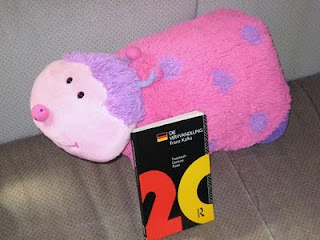*****
The Devil's Workshop (translated by Alex Zucker) starts off with a man in a ditch, hiding from the police and running away from a city in flames (which is always an interesting way to start a novel). Before too long, we're taken back a little to learn how he got there, ending up in the Czech town of Terezín, the site of a Nazi-era prison, the last stop before the concentration camps.
The authorities want to 'sanitise' the town, focusing the tourist industry on a small portion of Terezín, but a group of outsiders and 'death tourists' hope to keep it all as a museum. Under the guidance of Lebo, a man born in the prison, they appeal to the outside world for help, using the narrator's computer skills to run a worldwide fundraising campaign. Although they are initially successful, by the time Alex and Maruška arrive, the writing is on the wall for the project. However, the two latecomers approach the narrator with an offer of similar work in their home country - and off we go to Belarus...
The Devil's Workshop is a fairly short book, but a lot happens in the space of its 160 pages. It's a novel which draws the reader's attention to what happened in the Second World War before moving on to later atrocities; while Terezín is fairly well known (especially to anyone who has read Sebald's Austerlitz...), events that took place in Belarus are less understood. Topol uses the structure of his book, a story in two halves, to compare and contrast the two events, creating some very clever, effective parallels.
The first half concentrates on Terezín and the 'bunk seekers', young people driven mad by their inability to understand how the Holocaust could have happened:
"Ordinary tourists strolled through Terezín like it was a medieval castle, taking snapshots, shooting videos of the dungeons and torture chambers to show the family afterwards. The bunk seekers would never even think of such a thing. They showed up here crazed with pain, seized by the eternal question every seeker asked: If it happened here, can it happen again?"These shattered young people are only too willing to help create a Holocaust tourist industry, one underwritten by rich sympathisers, in an attempt to come to terms with the past. Sadly though, we also get glimpses of a fascist present when the narrator witnesses the 'Patriot Guards' chasing ethnic kids through the streets of Prague (plus ça change...).
p.32 (Portobello Books, 2013)
It's only when we get to Belarus that we see things in context - the second half is suddenly much darker. Once again, we're on the run, but everything here is bigger, worse, scarier. There are uprisings in the streets, government crack-downs, guns and knives - the people fill the enormous boulevards, filling the poor Czech narrator with fear. The events back in Terezín now look like a provincial squabble...
It's only here that we get the true idea behind the book. Angered by the success of memorial sites further west, Alex, Maruška and their leader, Kagan, are determined to spread the message about the massacres in Soviet-era Belarus, a Holocaust which nobody knows about. Terezín and Auschwitz are famous - why shouldn't Khatyn join the list? Alex reveals the plan - a museum:
"Museum, I say, looking around. What museum? Besides the mannequins there's nothing but crates. Crates full of specimens.This is no grey building filled with maps and pottery though - it's set to be a 'museum' which makes the Terezín efforts look like a kindergarten display...
The museum we're building in Khatyn, Alex says. It's going to be the most famous memorial site in the world. The devil had his workshop here in Belarus. The deepest graves are in Belarus. But nobody knows about them. That's why you're here!" (p.107)
The Devil's Workshop is a great, quick read, a novel which is very much action-driven, keeping the narrator (and the reader) constantly on the move. The book is very cleverly plotted, with two parallel halves, the second being a monstrous, deformed version of the first. The only drawback for me is that the writing is fairly simple. It's a great story, full of thought-provoking ideas, but fairly ordinary prose. That's a minor quibble though, and I suspect that this wouldn't be an issue for the majority of readers.
It won't be on my end-of-year list, but I did enjoy the book, and I suspect that most who read this will enjoy it too. Given the success Holocaust-themed novels have had in recent years (e.g. Blooms of Darkness, Trieste), there's a good chance that this will be up there for the IFFP & BTBA awards next year too. It's a twist on Holocaust literature, calling attention to other disasters, equally deserving of notice. Of course, sadly it's also a reminder that persecution is not just a thing of the past...










